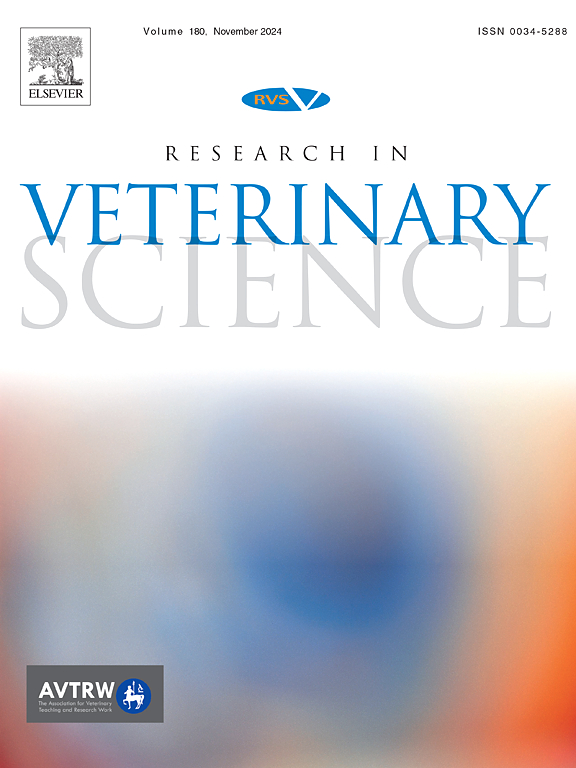Exploring the anticoccidial efficacy of Houttuynia cordata: Insights into gut microbiota modulation and metabolic enhancement in lambs
IF 1.8
3区 农林科学
Q1 VETERINARY SCIENCES
引用次数: 0
Abstract
Eimeria primarily infects the intestinal epithelial cells of livestock and poultry, disrupting gut microbiota and metabolism, which can result in diarrhea and weight loss. In severe cases, it can lead to hematochezia and even mortality. Modern intensive and large-scale farming practices, combined with the fecal-oral transmission of coccidia, create environments conducive to coccidial infections. Chemical control methods may lead to drug residues, drug resistance, toxic side effects, and other related issues. In contrast, Chinese herbal medicines typically exhibit multi-target, multi-pathway, and synergistic properties in disease resistance. In this study, the McMaster counting method was employed to assess the anti-coccidial effects of Houttuynia cordata (H. cordata) in its untreated forms (raw, water extract, and alcohol extract). The impact of these treatments on the intestinal microbiota and metabolites of lambs was examined using 16S rRNA gene sequencing technology and non-targeted metabolomics. The findings indicated that H. cordata reduced the excretion of intestinal coccidian oocysts in lambs. Notably, the alcohol extract of H. cordata (HA) significantly enhanced the average daily weight gain (ADG) and increased the abundance of unclassified Lachnospiraceae, Christensenellaceae R_7 group, and UCG_005. Additionally, metabolites such as 6-Deoxyerythronolide B, Parthenolide, and Bacilysin were highlighted for their potential significance. Overall, HA demonstrated superior anticoccidial effects and improved weight gain, likely due to the enhancement of beneficial microbiota and metabolites. This study provides a theoretical foundation for understanding the mechanisms by which Chinese herbal medicine combats coccidiosis through the modulation of intestinal microbiota and metabolism.
探索鱼腥草的抗球虫功效:对羔羊肠道菌群调节和代谢增强的见解
艾美耳球虫主要感染畜禽的肠上皮细胞,破坏肠道微生物群和代谢,导致腹泻和体重减轻。在严重的情况下,它会导致便血甚至死亡。现代集约化和规模化耕作方式,加上球虫的粪口传播,创造了有利于球虫感染的环境。化学控制方法可能导致药物残留、耐药性、毒副作用和其他相关问题。相比之下,中草药在抗病方面通常表现出多靶点、多途径和协同作用。在本研究中,采用麦克马斯特计数法评估鱼腥草(H. cordata)未经处理的形式(生提取物、水提取物和酒精提取物)的抗球虫作用。采用16S rRNA基因测序技术和非靶向代谢组学技术检测这些处理对羔羊肠道微生物群和代谢物的影响。结果表明,球虫可减少羔羊肠球虫卵囊的排泄。值得注意的是,虫草醇提物(HA)显著提高了平均日增重(ADG),增加了未分类毛螺科(Lachnospiraceae)、Christensenellaceae R_7组和UCG_005的丰度。此外,代谢物如6-脱氧红素内酯B、Parthenolide和Bacilysin因其潜在意义而被强调。总的来说,透明质酸表现出优越的抗球虫作用和改善体重增加,可能是由于有益微生物群和代谢物的增强。本研究为了解中药通过调节肠道菌群和代谢来防治球虫病的机制提供了理论基础。
本文章由计算机程序翻译,如有差异,请以英文原文为准。
求助全文
约1分钟内获得全文
求助全文
来源期刊

Research in veterinary science
农林科学-兽医学
CiteScore
4.40
自引率
4.20%
发文量
312
审稿时长
75 days
期刊介绍:
Research in Veterinary Science is an International multi-disciplinary journal publishing original articles, reviews and short communications of a high scientific and ethical standard in all aspects of veterinary and biomedical research.
The primary aim of the journal is to inform veterinary and biomedical scientists of significant advances in veterinary and related research through prompt publication and dissemination. Secondly, the journal aims to provide a general multi-disciplinary forum for discussion and debate of news and issues concerning veterinary science. Thirdly, to promote the dissemination of knowledge to a broader range of professions, globally.
High quality papers on all species of animals are considered, particularly those considered to be of high scientific importance and originality, and with interdisciplinary interest. The journal encourages papers providing results that have clear implications for understanding disease pathogenesis and for the development of control measures or treatments, as well as those dealing with a comparative biomedical approach, which represents a substantial improvement to animal and human health.
Studies without a robust scientific hypothesis or that are preliminary, or of weak originality, as well as negative results, are not appropriate for the journal. Furthermore, observational approaches, case studies or field reports lacking an advancement in general knowledge do not fall within the scope of the journal.
 求助内容:
求助内容: 应助结果提醒方式:
应助结果提醒方式:


